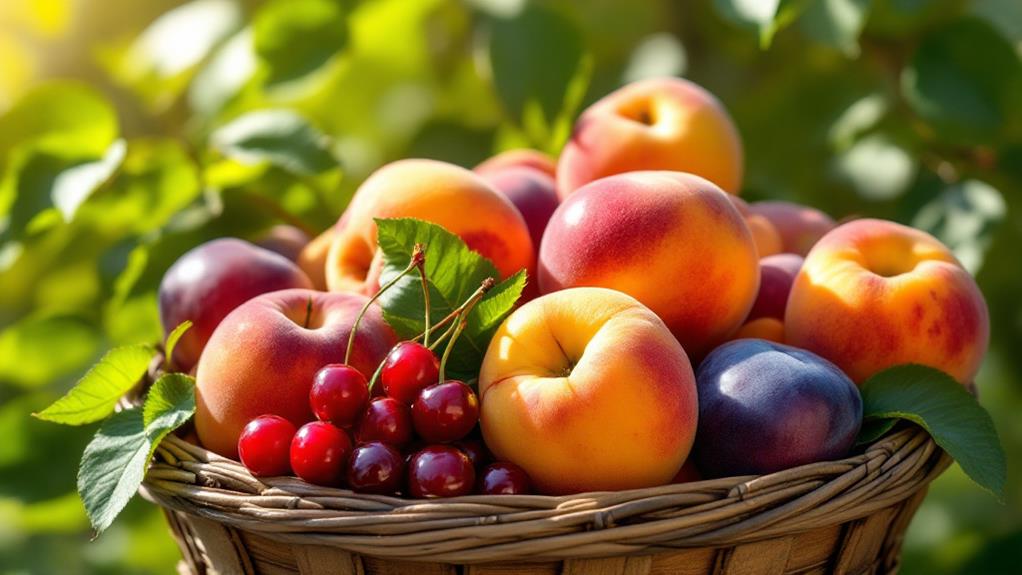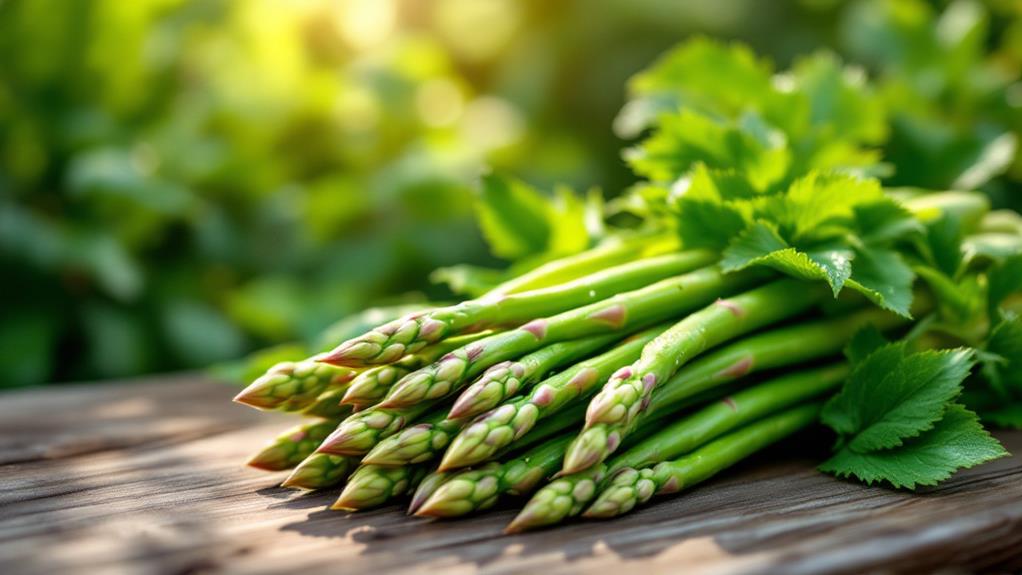The Best Fruits for Weight Loss: Nutritional Tips for Slimming Down
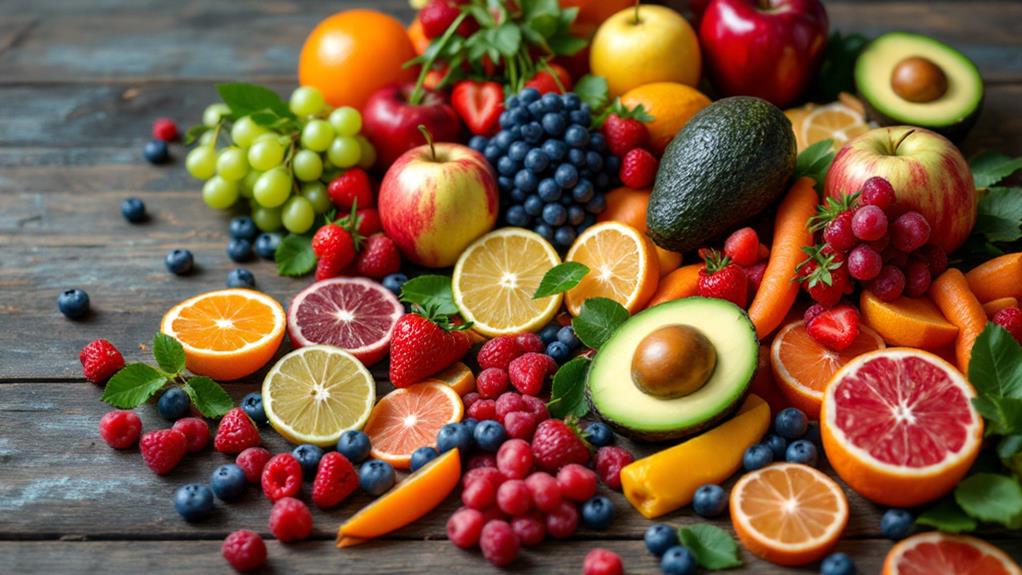
To slim down effectively, incorporate fruits like grapefruit, raspberries, and watermelon into your diet, as they're low in calories and high in water and fiber, promoting satiety. Grapefruit stands out for its potential fat-burning properties, while raspberries offer a fiber-rich punch. Stick to whole fruits instead of juice to retain valuable nutrients and fiber. Pair fruits like peaches or passion fruit with protein for improved fullness and curb cravings with smart snacking. Be cautious with dried fruits and fruit juices as they're higher in sugar and calories. Uncover more tips to optimize your weight loss plan efficiently.
Top Low-Calorie Fruits
When you're looking to shed some pounds, focusing on low-calorie fruits can be incredibly beneficial. Grapefruit is a standout choice with just 37 calories in half a fruit, known for its potential fat-burning properties and high vitamin C content. Including it in your diet might help you lose weight effectively. Berries, such as raspberries and strawberries, are another excellent option. They're low-calorie, nutrient-dense, and packed with fiber. With only 64 calories per cup, raspberries can promote fullness, making you less likely to overeat.
Watermelon is a hydrating delight, composed of about 90% water. At just 30 calories per 100 grams, it's perfect for keeping your calorie intake low while staying refreshed. Peaches offer a sweet treat without breaking your calorie bank, as a medium peach contains about 58 calories. These stone fruits are nutrient-dense and can help satisfy your sweet cravings while keeping you on track.
Lastly, consider passion fruit. Although lesser-known, this fruit is a powerhouse for appetite control with only 18 calories per fruit and a hefty fiber content. Incorporating these fruits into your routine can support your weight loss expedition effectively.
Nutritional Advantages
Plunge into the nutritional advantages of fruits, and you'll uncover a wealth of health benefits that support weight loss. Fruits are naturally low in calories yet high in water content, making them ideal for healthy weight management. For example, watermelon is a hydrating snack with just 30 calories per 100 grams due to its 90% water content. This high water content, along with the fiber in many fruits, promotes fullness and reduces total calorie intake, helping you maintain or lose weight effectively.
High-fiber fruits, like raspberries and pears, improve satiety, which means you're less likely to overeat. Raspberries pack 8 grams of fiber per cup, while pears offer 6 grams each. This fiber richness helps control appetite, playing a vital role in reducing body fat. Furthermore, fruits are loaded with antioxidants like polyphenols found in apples and blueberries, which are linked to enhanced metabolic health and reduced fat gain over time.
Citrus fruits, especially grapefruit, are remarkable for their potential fat-burning properties. Studies suggest that grapefruit consumption before meals can greatly reduce body weight. By replacing high-calorie snacks with fruits, you can boost total health and maintain a healthier BMI.
Smart Consumption Tips
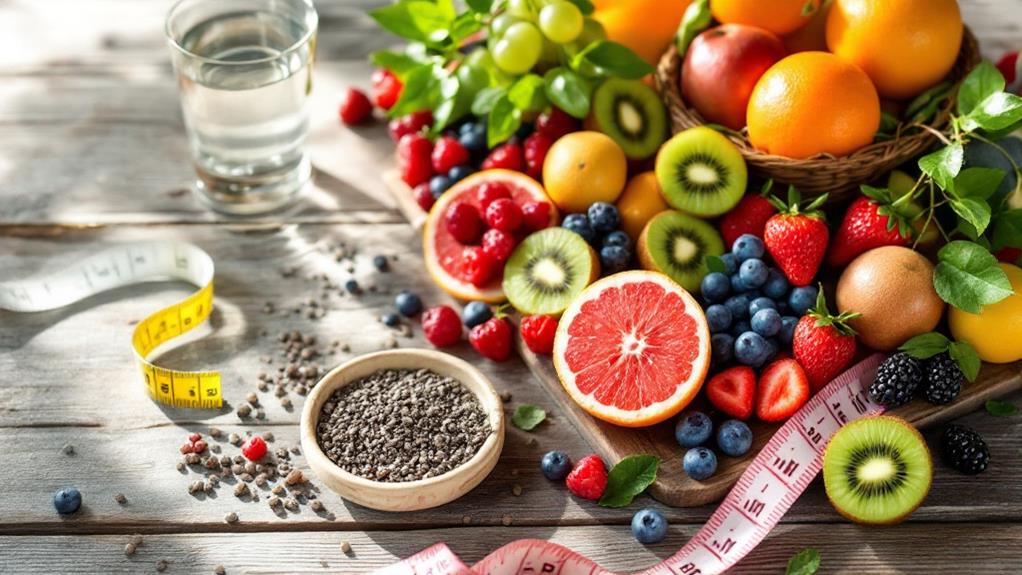
Although fruits are a foundation of a healthy diet, consuming them smartly can greatly enhance your weight loss efforts. Start by focusing on whole fruits instead of juices. Whole fruits retain their fiber content, which is essential for promoting satiety and helping you reduce overall calorie consumption. Including a variety of low-calorie, high-fiber fruits like apples, berries, and grapefruit in your daily diet can markedly aid in effective weight management.
Aim to consume 1.5 to 2.5 cups of fruit each day. This amount supports weight loss while improving overall nutrition. Fruits make excellent snacks or meal replacements, helping curb unhealthy cravings and lower your caloric intake. For an added increase in fullness, pair your fruits with protein-rich foods.
Be mindful of portion sizes when enjoying fruits. Even healthy options like avocados and bananas are higher in calories, so moderate your intake to prevent consuming excess calories. By carefully monitoring portion sizes, you can enjoy the health benefits of these fruits without hindering your weight loss goals. Adopt these smart consumption tips to make fruits an effective part of your healthy diet and weight loss experience.
Role in Weight Management
Embracing fruits in your diet plays an important role in weight management. Whole fruits are naturally low in calories and high in fiber, making them an excellent choice for anyone looking to manage their weight effectively. By incorporating them into your meals, you can improve feelings of fullness, which helps reduce total calorie intake—a vital factor for weight management. High-fiber fruits like apples and raspberries are particularly effective at keeping hunger at bay, leading to a lower body weight over time.
Fruits with a low glycemic index, such as grapefruit and berries, are especially beneficial for fat loss. Their high antioxidant content may help regulate your metabolism and appetite, supporting a healthier body weight. Regular consumption of these nutrient-rich fruits is linked to a lower risk of weight gain, making them a smart supplement to a balanced diet.
Fruits to Limit
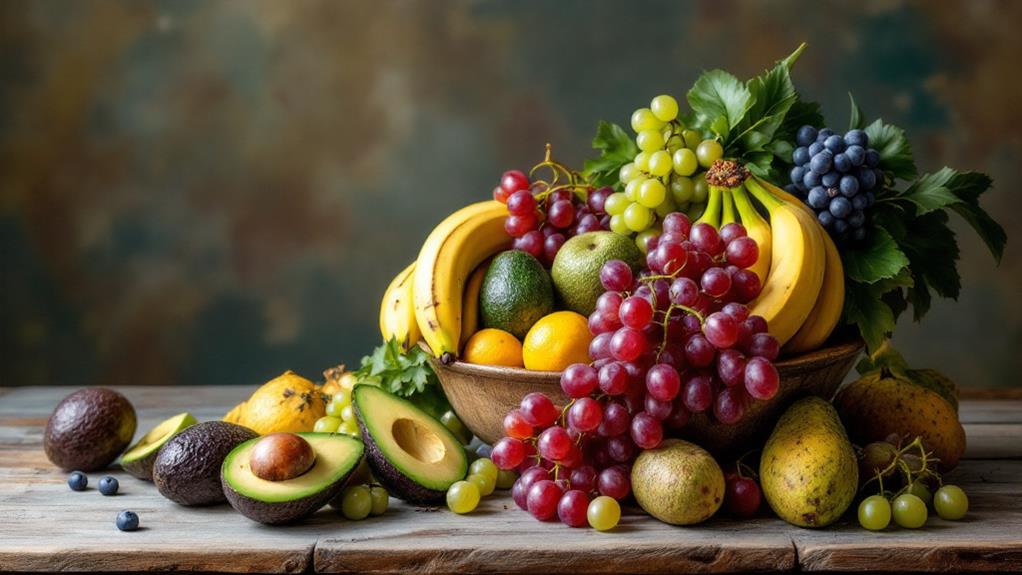
When aiming for weight loss, it is crucial to be mindful of certain fruits that might hinder your progress if consumed in large quantities. Dried fruits pack a punch regarding calories because of their reduced water content. You should exercise portion control, keeping in mind that just a quarter cup of dried fruits provides the same calories as a half cup of fresh fruit.
Fruit juices can also be tricky. While they might seem like a healthy option, they often lack fiber and can contain high concentrations of sugar. Drinking more than one glass daily might lead to excess calorie intake and slight weight gain. High-sugar fruits like grapes and bananas, although nutritious, should be enjoyed in moderation due to their higher calorie content compared to fruits like berries or watermelon.
Consider these points:
- Dried Fruits: Limit to a quarter cup serving to manage calorie intake.
- Frozen Fruits: Opt for those without added sugars for better weight management.
- Fruit Smoothies: Be cautious of added sugars and high-calorie ingredients.
Practical Incorporation Strategies
While aiming for weight loss, it's essential to incorporate fruits into your diet in a way that's both enjoyable and effective. Start by including a variety of fruits, targeting 1.5 to 2.5 cups daily. This helps promote satiety and reduces total calorie intake. Use fruits as healthy snacks or meal replacements. For example, pair apples or berries with yogurt to improve protein intake and increase fullness. This combination offers both flavor and nutrients, keeping you satisfied longer.
Prepare fruit salads or smoothies to retain fiber content. These options allow you to enjoy a diverse range of flavors and nutrients in one meal. Slice whole fruits to manage portion sizes effectively, making them easier to include in meals or as snacks without overconsumption. This simple strategy guarantees you're getting the right amount without excess calories.
Incorporate fruits into your breakfast or as pre-workout snacks. Consuming fruits like bananas or berries can provide quick energy and support metabolism throughout the day. Regardless of whether you're starting your morning or gearing up for a workout, fruits offer natural energy and a nutrient increase, setting you on the right path for weight loss success.


